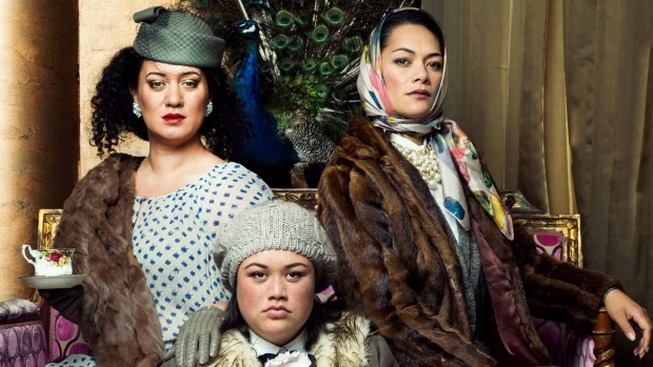Swati Bhatt

Written and directed by Mīria George
Presented by Tawata Productions as part of Kia Mau Festival 2016
The Vultures presented by Tawata Productions is the second show of the Kia Mau Festival that opened last night. The development season of the play was presented as part of the Pūtahi Festival 2015 at Studio 77, written and directed by playwright Mīria George. The premiere season of the show, now at Bats Theatre, revolves around the human desire of wealth, the connection of the whānau (family/community) to the whenua (land) and the status quo within a wealthy Māori family.
The performance opens with the simple but elegant set covered with a white fabric which is unveiled by one of the performers Carrie Green revealing it to the audience for the first time. The set design by Tony De Goldi is simply brilliant and adequately utilised by the performers to project the ancestral house as well as a yacht sailing in the polluted (toxic) lake. The simple and effective light design by Natala Gwiasdzinki cleverly put together to project the distinction between the two major ways the space is used. The performance uses light recorded music designed by K*Saba that contributes towards overall impact of the show. The costume design by Sopheak Seng is very impressive and enables the audience to recognise the financial as well as emotional state of the characters.
The two siblings, Atawhai (Awhina Rose Ashby) and Petera (Natano Keni) enter the stage in feather collar costumes and stern expressions establishing themselves as the vultures. Atawhai wears dark lipstick and her costuming is similar to house riding gear, while still maintaining the aesthetic of the upper class. Petera has an exaggerated hunchback and moves with the support of a cane, and wears an old fashioned grey suit. Atawhai is presented as dominating and ambitious and dreams of making her biographical documentary to present it internationally. Petera is presented as crooked businessman with selfish intentions but seems vulnerable against the dominating elder sister Atawhai. The younger sister and nurse Hinemoa (Carrie Green) wears a light coloured dress with a warm beige jacket and a beige coloured nursing head cover. Hinemoa is shown concerned about the preservation of the ecology and the ancestral belonging.
Kiwi (Hine Parata-Walker) is shown as a young microbiologist wearing gum boots, protective coat and the head torch. She is an intelligent 18-year-old who understand the clever intentions of Atawhai and Petera and supports her mum. She actively resists the destructions happening at two different levels, one, within the family and the other within the ecology. The flip side of Kiwi’s character is her natural need of an emotional support shown through her talk over the phone call that makes the audience sad and giggle at the same time. Te Rawhitiroa (Tola Newbery) is an innocent 15-year boy wearing exercise gears who tries to fulfil the expectations of his dad. He showcases his multilingual skills by speaking in Spanish and Cantonese to his dad’s foreign visitors in a way that makes the audience laugh.
Bold and honest expression of the family war and the advocacy for preserving the land and ecology presented in the powerful voices of mana wāhine offers strong insight into the least explored world of wāhine Māori. Maori values of tangata whenua (people of the land) and tinorangatiratanga (self-determination) are emphasised through female voices of Hinemoa and Kiwi demonstrates women as protectors/guardians of the cultural values. The matriarchal authority is further demonstrated through powerful character of Atawhai performed by Awhina Rose Ashby with her strong authoritative voice and movements. The delicacy and womanly emotions of motherly love and care is portrayed through the character of Hinemoa performed by Carrie Green with intense emotions and her convincing soft voice. Another strong character Kiwi performed by Hine Parata-Walker, brilliantly showcase the strength of wahine and matriarchal authority over the family by demonstrating constant resistance against the destructions. ‘The Vultures’ become the symbol of both cruelty and power.
The performance is a must watch to feel the freshness and originality of the Māori theatre this Matariki and an added feather to the cap of an exceptionally brilliant playwright Mīria George. This highly recommended and captivating Māori theatre piece at Kia Mau Festival is not to be missed. The Vultures season continues till the 18th of June at the Propeller stage at Bats Theatre, each night at 8pm.





